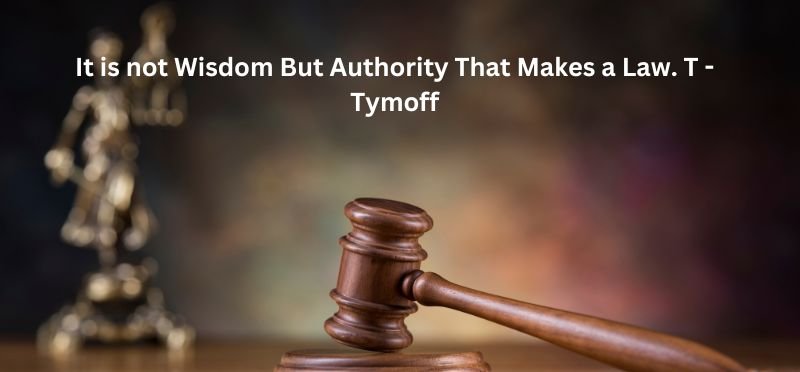
It is not Wisdom But Authority That Makes a Law. T – Tymoff
Welcome, curious minds and legal enthusiasts! Have you ever pondered the intricate dance between authority and wisdom in the realm of lawmaking? Join us on a thought-provoking journey as we unravel the complex dynamics that shape our legal systems. In this blog post, we delve into the age-old adage: “It is not Wisdom But Authority That Makes a Law. T – Tymoff” Prepare to explore the nuanced interplay between power, morality, and the quest for harmony in our laws. Let’s embark on this enlightening exploration together!
The Force of Authority: Power as the Cornerstone of Law
Authority, with its commanding presence, stands as the bedrock upon which laws are built. In the realm of legal systems, power reigns supreme, dictating the rules that govern societies. It is the force of authority that enforces compliance and maintains order in our complex world.
The inherent hierarchy embedded within authority structures shapes the very essence of lawmaking, underscoring the importance of wielding power responsibly. As we navigate through this intricate landscape, let us unravel how authority intertwines with wisdom to mold our legal frameworks.
Understanding Wisdom in Lawmaking
Wisdom in lawmaking goes beyond mere intellect. It encompasses the deep understanding of societal needs, values, and ethics. By drawing on experience, empathy, and foresight, lawmakers can craft regulations that truly serve the common good.
The wisdom in lawmaking requires a delicate balance between tradition and progress. It involves recognizing the complexities of human behavior and anticipating potential consequences. Through thoughtful reflection and consideration of diverse perspectives, laws can embody not just authority but also moral guidance for society.
Authority and its Influence on Lawmaking
Authority plays a pivotal role in the realm of lawmaking, shaping the very fabric of our legal system. It is through authority that laws are established, enforced, and upheld in society. The power vested in legislative bodies and judicial institutions holds immense influence over the creation and interpretation of laws.
Those in positions of authority wield significant power to shape policies, regulations, and legal frameworks that govern our daily lives. Their decisions not only reflect societal values but also have far-reaching implications for justice, order, and individual rights. The intricate relationship between authority and lawmaking underscores the delicate balance between governance and accountability within a functioning democracy.
The Allure of Wisdom: Law as a Beacon of Morality
Wisdom, often seen as the beacon guiding the creation of laws, holds a unique allure in shaping moral standards within society. It serves as a compass, navigating the intricate waters of right and wrong, justice and fairness. The integration of wisdom into legal frameworks not only reflects societal values but also sets a precedent for ethical conduct.
In its essence, law embodies more than just rules; it represents a collective understanding of what is morally acceptable. Wisdom infuses this understanding with depth and insight, elevating laws beyond mere regulations to embody principles that reflect the very fabric of our shared humanity.
Wisdom as a Guiding Principle
Wisdom serves as a beacon guiding the principles of lawmaking, offering insights and foresight into creating just and equitable regulations. It is the accumulated knowledge, experience, and ethical understanding that shape the foundation of legal systems worldwide. The wisdom embedded in laws reflects society’s values, aspirations, and visions for a harmonious coexistence.
Drawing upon timeless truths and moral compasses, wisdom infuses legislation with depth and integrity. By embodying universal principles rooted in fairness and justice, laws imbued with wisdom stand the test of time amidst evolving societal norms and challenges.
Wisdom in Legal Precedents
Legal precedents serve as the foundation upon which future decisions are built. They embody the collective wisdom of past judgments, shaping the course of law. Each ruling reflects a nuanced understanding of complex legal issues, offering guidance to judges and lawyers alike.
By studying these precedents, legal professionals gain insight into how principles have been applied in various contexts. The wisdom embedded in each case sets a precedent for interpreting and applying the law with prudence and foresight.
The Intertwined Strands: Authority and Wisdom in Harmony
Authority and wisdom in law are like two strands of a rope, intertwined to create a strong foundation for justice. While authority provides the power to enforce laws, wisdom guides the moral compass behind them. Balancing these elements is crucial in ensuring fair and just governance.
When authority and wisdom work in harmony, laws reflect not only the power of the state but also its ethical principles. It is this delicate balance that upholds the legitimacy of legal systems and fosters trust among citizens. In navigating the complexities of lawmaking, finding unity between authority and wisdom is key to creating a just society where laws serve as beacons of morality.
Harmony or Conflict: Wisdom and Authority in Law
In the realm of law, a delicate dance unfolds between wisdom and authority. While authority wields power to enforce laws, wisdom serves as the moral compass guiding legal decisions. The interplay between these two forces can either lead to harmony or spark conflict within the legal framework.
At times, the weight of authority may overshadow the nuances of wisdom, resulting in rigid enforcement that lacks moral depth. Conversely, an overemphasis on wisdom without authoritative backing can lead to ambiguity and inconsistency in legal outcomes. Striking a balance between these elements is essential for creating a just and effective legal system that upholds both power and morality.
The Role of Deliberation and Discourse
Deliberation and discourse play a crucial role in the creation and interpretation of laws. When lawmakers engage in thoughtful discussion and debate, they can consider various perspectives, weigh different arguments, and make informed decisions. This process ensures that laws are not hastily crafted but rather thoughtfully deliberated upon to serve the greater good.
Through open dialogue and constructive discourse, lawmakers can address complex issues, reconcile conflicting interests, and ultimately create laws that reflect societal values. Deliberation allows for diverse voices to be heard, fostering a more inclusive decision-making process that upholds the principles of democracy.
The Ongoing Quest: Balancing Power and Morality
In the realm of law, there exists an ongoing quest to strike a delicate balance between power and morality. The authority vested in lawmakers must be wielded with wisdom and ethical considerations to ensure just and fair outcomes for all.
Navigating this intricate web requires constant reflection, adaptation, and a deep understanding of the impact that laws have on society as a whole. It is not merely about asserting authority but also about upholding moral principles that guide the foundation of our legal system. The interplay between power dynamics and ethical standards shapes the very essence of our laws, making this quest for equilibrium an ever-evolving journey.
The Role of Legislative Bodies
Legislative bodies hold a pivotal role in shaping the laws that govern society. These elected representatives are entrusted with the responsibility of creating, amending, and repealing legislation to reflect the evolving needs of the people they serve. Through debates, discussions, and voting processes, legislative bodies play a crucial part in ensuring that laws are just, fair, and representative of societal values.
The decisions made by these bodies not only impact the present but also shape the future trajectory of legal frameworks. By deliberating on various perspectives and weighing different interests, legislative bodies strive to strike a balance between authority and wisdom in their lawmaking endeavors.
Judicial Authority and Legal Interpretation
Judicial authority plays a crucial role in the legal system, shaping the interpretation and application of laws. Judges wield significant power in determining how laws are understood and enforced. Their decisions can set precedents that influence future cases and guide societal norms.
Legal interpretation is not always clear-cut; it involves weighing various factors like legislative intent, precedent, and societal context. Judges must navigate these complexities to ensure fair and just outcomes. The interplay between judicial authority and legal interpretation highlights the dynamic nature of law as it adapts to changing circumstances.
Conclusion: Beyond the Dichotomy
As we delve into the intricate world of lawmaking, it becomes evident that the relationship between authority and wisdom is a complex one. Beyond the dichotomy lies a realm where these two forces intertwine, shaping the legal landscape in ways both profound and nuanced.
Navigating this balance requires a delicate dance, where power and morality coexist in harmony rather than conflict. It is within this gray area that legislators and judicial authorities must operate, constantly striving to find equilibrium between enforcing laws with authority while upholding them with wisdom. The quest for harmony continues, challenging us to explore the depths of legal intricacies without succumbing to oversimplified binaries.
The Quest for Harmony
The quest for harmony in law is a delicate balancing act between authority and wisdom. It requires navigating the complexities of power dynamics while upholding moral principles. Striving for harmony means seeking a middle ground where laws are just, fair, and reflective of societal values.
Achieving harmony involves continuous dialogue, debate, and introspection within legislative bodies and judicial systems. It is an ongoing process that demands careful consideration of both legal precedents and the evolving needs of society. In this pursuit lies the essence of creating laws that command respect through their blend of authority and wisdom.
Tensions and Dilemmas
Navigating through the intricate landscape of lawmaking, it becomes evident that the interplay between authority and wisdom is a complex and nuanced one. While authority provides the power to enforce laws, wisdom serves as a guiding light towards moral decision-making. The tensions and dilemmas that arise from balancing these two forces underscore the ongoing quest for harmony in legal systems worldwide.
As societies evolve and values shift, legislators and judicial bodies must continue to navigate these challenges with prudence and foresight. By fostering deliberation, discourse, and a deep appreciation for both authority and wisdom, we can strive towards creating laws that not only uphold order but also reflect the highest ideals of justice.
In this dynamic interplay between authority and wisdom lies the heart of legislative processes – where power meets morality, where rules meet reason. It is through this delicate balance that laws are not merely imposed but are embraced by society as embodiments of fairness, equity, and righteousness.
It is not just about enacting laws but about upholding principles that stand the test of time. As we grapple with the complexities of governance in an ever-changing world, may we always remember that true legitimacy does not stem solely from authority or wisdom alone but from their harmonious integration in service to a just society.



